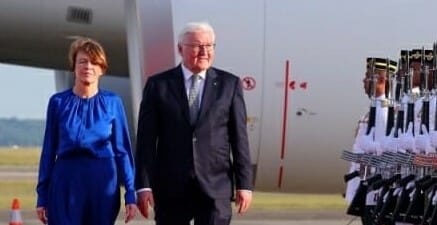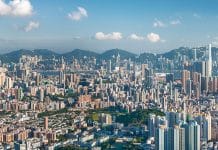German president Frank-Walter Steinmeier’s visit to Malaysia signals a new orientation of the criticality of our bilateral ties that supersedes the mutual interests of both countries alone. The last visit by a German President was in 1997.
Areas of common interests including the new green and digital economy transformation, supply chain resilience, food security, high impact technology development, semiconductor sustainability and security and enhancement of people to people ties, which will remain one of the most critical fronts for the long term interests of both countries.
Germany is Malaysia’s largest trading partner in the European Union (EU). Last year, Malaysia’s total trade with Germany increased to RM59.87 billion, from RM53.99 billion in 2021.
These normative and expansive spectrum of crucial sectors will be high on the agenda, but the overriding factor and priority will be on preserving the long term support and buy-in from both states in ensuring geostrategic and geopolitical returns that will top the overlying agenda setting for both.
For Berlin, Kuala Lumpur remains one of the most critical geopolitical partners in this region, and increasingly vital in its quest to increase and bolster its presence in the Indo Pacific. His Excellency Steinmeier has also indicated the expected areas of importance and interest during the visit, namely in enhancing the semiconductor industry which Germany has an ingrained and progressive presence here in Malaysia, and also in developing local talent and empowering the youth.
Malaysia should build on this to create greater confidence, support system and readiness on our part in talent pool, tax credits, facility and capital support and other supportive mechanisms to further attract and retain the high value and long term presence of these critical investments that will ensure our best interests and geostrategic survival.
The advent of green and digital economy that is led by a revamp and reimagining of our educational approach and scientific advancement, must be wisely galvanised by tapping into Germany’s leading scholarly credentials in these areas, including in jointly tackling existential threats in the form of climate change and food and resources sustainability. Further efforts must be made to bolster people to people exchanges and appreciation and in expanding the joint research platforms and academic collaborations between the two countries.
Political relations between Malaysia and Germany are principally based on the two countries’ intensive economic relations. Germany sees Malaysia as an important and stable partner in Southeast Asia, a leading member of ASEAN and a moderate representative of the Islamic world.
The fact that around 700 German companies are based in Malaysia, many of which run production plants and export the goods they manufacture worldwide, is a testimony of the quintessence of Malaysia’s increasing importance to Germany and Europe.Malaysia is also increasingly being used by German companies as a regional hub for Southeast Asia and beyond.
Kulim Infineon’s RM8 billion expansion project reflects the growing investor confidence in the country and seeing Malaysia from a growing important lense of geostrategic returns for the West in this high impact field of technological spillover effects. In getting the long term benefits of a stable, progressive and sustainable industry and support system in this spectrum of future driven sectors, Berlin and Europe with the West as a whole stand to gain the needed positive impact.
Our strength and potential in the semiconductor industry in ensuring the sustainable supply chain and returns for the West, must be seized upon to also include the greater opening to deepen our security and defence ties with Berlin, in which more security cooperation mechanisms including expertise exchanges and asset transfer should be prioritised.
This will remain crucial for Berlin’s new Indo Pacific pursuit, and we will stand to gain more from a more extensive Germany’s security and hard power presence in the region, in helping to increase our collective deterrence capacity against both traditional and non traditional challenges.
Germany’s latest efforts for Indo Pacific through its inaugural marathon flight to Asia by its Eurofighter jets last year, on top of its Bayern frigate’s seven-month deployment in Indo Pacific, signals a four-pronged objective. First, it intends to signal to Beijing that it is ready for a decreased strategic dependence and for an enhanced stance in protecting its greater economic and geostrategic calculations in the region.
Secondly, to warn Moscow and future adversaries, that Berlin intends to exit its conventional defensive focus to one that is more proactive in nature, with a more agile and assertive defensive posture. The rapid deployment of its inaugural Eurofighter jets across the continent last year aims to demonstrate the agility for Berlin to spread its airpower to a distant potential conflict locality, ready for surgical intervention to secure its interests abroad despite the lack of an aircraft carrier.
Thirdly, Berlin would want to reclaim greater leadership in the West, playing a deeper role in return for more consolidated trust and reciprocal support for its defensive needs outside the sphere of NATO and in anticipating starker threats originating from Indo Pacific. Fourth, the shift of intent in security calculations is to be communicated to the domestic audience in pushing for heightened public support on the new stature in the security architecture, and to solicit greater national unity and political wins.
All these reflect the intent and pursuit in going for the long term returns of investments in the geopolitical resilience of Germany, in ensuring a vibrant, protected and resilient impact from the critical fields that will be crucial for Germany’s long term survival. This primarily includes the criticality of energy security, made even more critical amidst the Ukrainian conflict and the need to break from the dogma of energy dependence on Russia.
This domain is reflected in Berlin’s intent to deepen energy security settings with new potential venture in Petronas to provide supply of LNG to Germany and the EU, including exploring cooperation in green mobility and new energy platforms that will see knowledge transfer and capacity building which will be crucial for both countries, particularly Germany in its quest for greater reliability on energy security.
Sensing the importance of mutual cooperation and the returns to both countries’ long term geopolitical and security considerations, existing issues including the palm oil debacle must be handled with the needed foresight, as we must not forsake our future interests and security spectrum at the expense of short term benefits by doubling down on our stance in this regard. Berlin is also cognisant of this fact, and would also be wise to adjust its policy accordingly, and in getting Brussels to do the same in realising the crucial role we play for the EU’s larger Indo Pacific agenda. Conversely, we also rely on Berlin’s growing clout and leadership in both hard and soft power projections and executions, both in Europe and the Indo Pacific.
We will need Germany’s established leadership in the EU to continue to play an expansive, integrated and normative role in shaping regional and global idealistic pursuit of preventive diplomacy and conflict prevention mechanisms, as well as playing the wider connecting role in bridging civilisational divide and in helping to preserve the rules based order of the international system both in jointly addressing common threats to civilisations and in protecting common humanity values.
This will also create ripple effects for EU-Malaysia and EU-ASEAN ties in a myriad of platforms and mechanisms, especially in socio-economic and political cooperation that transcends conventional limitations. Berlin will also capitalise on our regional leadership credentials in ASEAN and related platforms to push for greater regional buy-in in advancing the economic, technology, supply chain and military progress and clout that will also benefit the region and Europe. Malaysia’s strength in our perspective and standing as a moderate and progressive Islamic nation, with equally admirable strength in counter terrorism and deradicalisation capacity, also provide a crucial and needed source of support and capacity for Germany in addressing its non-traditional challenges.
We must be wise and strategic to grab the opening presented, in starting our fundamental shift in core economic transition by capitalising on our geopolitical advantage and strength in these fields to further deepen our economic and investment ties with these Western firms, for they bring about the needed positive ripple effects and economic multiplier returns in an expansive and progressive mode.
The technology transfer, adherence to the moral high ground of global principles, values and norms of transparency, integrity and respect for critical parameters including environmental impact, labour standards, human rights and ethical governance and sustainability and green practices, all provide a new form of significant shift and incentivisation of transformation for both the government and private sector to create a lasting economic culture and system that are principle laden and value based, for the best returns for the country, both in long term geopolitical and socio-economic fronts.
By Collins Chong Yew Keat, University Of Malaya









